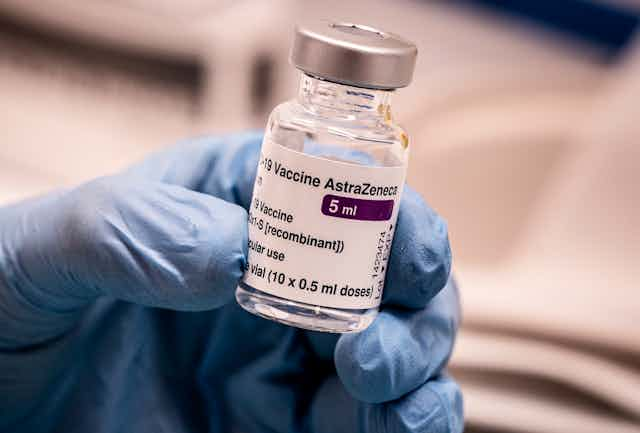As vaccine programmes gather pace worldwide, attention continues to focus on both viral mutations and the Oxford/AstraZeneca vaccine – sometimes simultaneously.
South Africa has temporarily halted the vaccine’s rollout. This is because a preliminary study (yet to be released or reviewed by other scientists) suggests that the vaccine provides limited protection against mild to moderate cases of COVID-19 caused by the South African variant of the coronavirus.
This may seem quite alarming. However, the study only involved young people, who tend to be less badly affected by COVID-19, and so it didn’t assess whether the vaccine protects against severe disease caused by the variant.
Shabir Madhi, Professor of Vaccinology at Wits University in South Africa, who was involved in the study, notes that the Oxford/AstraZeneca vaccine works in a similar way to the Johnson & Johnson vaccine. The latter is being tested in South Africa, with early data suggesting it’s 57% protective against moderate to severe COVID-19. This suggests the Oxford/AstraZeneca jab should also offer good protection against severe COVID-19 when facing the South African variant.
The World Health Organization (WHO) has since recommended that the Oxford/AstraZeneca vaccine should still be rolled out in areas affected by new variants – including the South African one.

This is our weekly round-up of expert information about the COVID-19 vaccines.
The Conversation, a not-for-profit group, works with a wide range of academics across its global network to produce evidence-based analysis and insights. Get more regular updates from trusted experts by subscribing to our free newsletter .
But even if the vaccine is likely to work, we should still be doing all we can to keep transmission of the new variants down, writes Zania Stamataki, Senior Lecturer in Viral Immunology at the University of Birmingham. The Oxford/AstraZeneca vaccine being effective against the South African variant doesn’t mean much if the virus is out of control and rollout has barely got started.
The WHO’s guidance also suggests that the Oxford/AstraZeneca vaccine should be given to over-65s, which has been a point of contention in recent weeks. A lack of data over the vaccine’s efficacy in older people has led some countries – such as Norway and France – to withhold it from older citizens.
But not recommending the vaccine for the elderly risks the lives of the most vulnerable, argue Jonathan Pugh and Julian Savulescu of the University of Oxford. As their calculations show, the efficacy of the vaccine would have to be incredibly low for it not to be worth giving to over-65s, given how much greater the risk of COVID-19 is to older people. And there’s a good amount of evidence suggesting efficacy should in fact be high.

Reassuringly, in countries where rollout is progressing at speed, it’s possible the effects of COVID vaccines are beginning to be felt, write Maximilian de Courten, Maja Husaric and Vasso Apostolopoulos from Victoria University in Australia.
The picture looks particularly convincing in Israel. Viral transmission is falling most steeply in those who were first in line to get a vaccine, and data suggests this isn’t simply down to the country’s current restrictions. Infection rates are also falling in the UK, but separating the effects of vaccines from those of lockdown hasn’t been possible yet.
But one thing that is clear about the UK, writes Robin Cohen, Emeritus Professor of Development Studies at the University of Oxford, is that it has vastly over-ordered the number vaccine doses it needs. Supplies may be limited now, but later in the year, Britain will have a surplus.
The UK and others in this position need to work out now how best to get these to those in other countries that need them most – as ultimately, this will benefit everyone. There’s even some suggestion, among the government’s scientific advisers, that this redistribution should happen before all of the British population has been vaccinated.
Get the latest news and advice on COVID-19, direct from the experts in your inbox. Join hundreds of thousands who trust experts by subscribing to our newsletter.

